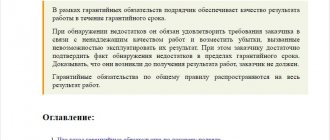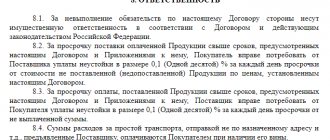General provisions on penalties, rules for including provisions on penalties in a contract
In accordance with Article 330 of the Civil Code of the Russian Federation, a penalty is a sum of money determined by law or contract that the debtor must pay to the creditor in the event of non-fulfillment or improper fulfillment of an obligation, in particular in case of delay in fulfillment.
Calculators for the government customer: automatic calculation of the NMCC, accurate calculation of deadlines for auctions and other procurement methods, selection of OKPD2 or KTRU code and checking for regulations in the Economy-Expert.Online program
Law No. 44-FZ provides for 2 types of penalties: fines and penalties. The law provides for liability for violation of the terms of the contract both on the part of the customer and on the part of the supplier (contractor, performer) (hereinafter referred to as the supplier). In this case, penalties are applied only for violation of deadlines (late delivery or fulfillment of a warranty obligation on the part of the supplier; late payment on the part of the customer). For other violations a fine is applied. The procedure, dimensions, and conditions for applying each type of penalty are indicated in the Penalty Memo.
Part 4 of Article 34 of Law No. 44-FZ speaks of the mandatory inclusion in the contract of conditions on the responsibility of the customer and supplier for non-fulfillment or improper fulfillment of obligations stipulated by the contract. Thus, liquidated damages clauses are essential terms of the contract and must be specified by all customers in all contracts. Exceptions are cases of purchase from a single supplier, listed in Part 15 of Article 34 of Law No. 44-FZ. In such procurements, some essential contract terms may not apply, for example, provisions on the liability of the parties.
The conditions for the amount and procedure for calculating penalties are specified in the contract for the supplier - in accordance with Part 7 of Article 34 of Law No. 44-FZ; for the customer - in accordance with Part 5 of Article 34 of Law No. 44-FZ. The procedure for calculating the fine is specified in the contract in accordance with the Rules for determining the amount of the fine accrued in the event of improper fulfillment by the customer, non-fulfillment or improper fulfillment by the supplier (contractor, performer) of the obligations stipulated by the contract (except for delay in fulfillment of obligations by the customer, supplier (contractor, performer), approved by Decree of the Government of the Russian Federation of August 30, 2021 N 1042 (hereinafter referred to as Rules No. 1042). Rules No. 1042 provide for the calculation of the fine as a percentage of the contract price, or, if the contract provides for stages of contract execution, as a percentage of the stage of contract execution. For the supplier the amount of the fine is determined in accordance with clauses 3-8 of Rules No. 1042, for the customer - clause 9 of Rules No. 1042.
It should be noted that simply including references to the relevant paragraphs of Rules No. 1042 in the contract is not enough. FAS Russia, in a letter dated December 1, 2014 N AD/48791/14, indicated that “...inclusion in the draft contract of a reference to the rules instead of establishing the above amounts of fines and penalties is not the proper fulfillment of the customer’s obligation to establish the amount of the penalty...”. Thus, the customer must indicate in the contract a penalty in the form of a percentage of the contract price (of the contract execution stage). At the same time, we do not recommend indicating the specific amount of the fine in rubles, since the price of the contract may change during its execution (for example, in the cases specified in Part 1 of Article 95 of Law No. 44-FZ), and the corresponding rules for changing the amount of the fine in contract are not provided for by law.
Sanctions for violation of contract terms
In general, a penalty is one of the types of sanctions for violating the terms of a contract. The parties may provide for other options, of course, which are not expressly prohibited by law. Much will depend on the type of contract. For example, in a lease agreement, sanctions may include both a penalty and an obligation to vacate the premises (return the leased object). There are a lot of options and there is no point in listing them.
I also recommend reading this article
Ways to ensure fulfillment of obligations
What is the article about? An article about what types of contract enforcement there are. Who will be useful and how? Company managers and
Continue reading
Supplier liability
An important point is that Part 6 of Article 34 of Law No. 44-FZ provides for the customer’s obligation to send the supplier a demand for payment of penalties (fine, penalty) in any case of violation by the latter of its obligations under the contract. That is, the customer is always obliged to send a demand if there was a violation of its obligations by the supplier. The customer does not have the right to choose whether to send a request or not.
From the procedure for calculating penalties and fines described below, exceptions are possible in cases where, in accordance with the legislation of the Russian Federation, the penalty for the supplier must be calculated in a different manner (for example, contracts for the provision of MTPL services).
What is improper performance and how does it differ from non-performance?
Any obligation assumed by a party to a transaction must be fulfilled in accordance with the requirements of the law or agreement, in accordance with the requirements of Art. 309 of the Civil Code of the Russian Federation. Situations are possible when a party to a contract partially fulfills its obligations, but allows partial failure to fulfill obligations under the contract. This behavior can be characterized as partial or improper fulfillment of the terms of the transaction.
Let's give an example. A contract has been concluded. The contractor fulfills all the terms of the contract, builds a house for the customer, but does not meet the deadlines. This is improper execution. In this case, the creditor incurs losses, compensation for which he has the right to demand in full.
2.1. Penalty for the supplier
The amount of the fine for the supplier is established by Part 7 of Article 34 of Law No. 44-FZ and is 1/300 of the key rate of the Central Bank of the Russian Federation in force on the date of payment. The penalty is calculated from the price of the contract (a separate stage of contract execution), reduced by an amount proportional to the volume of obligations stipulated by the contract (the corresponding stage of contract execution) and actually fulfilled by the supplier. The penalty is accrued for each day of delay in fulfilling the obligation, starting from the day following the day of expiration of the deadline for fulfilling the obligation established by the contract and including the day of actual fulfillment of the obligation by the supplier. In a letter from the Ministry of Finance of the Russian Federation dated April 13, 2016. No. 02-04-06/21780 states that the calculation of the penalty includes all calendar days “... regardless of the day off (holiday or non-holiday), the penalty is charged for each day of delay in the supplier’s fulfillment of the obligation provided for in the contract, starting from the day following the day of expiration the deadline for fulfilling the obligation established by the contract...". When the customer calculates the amount of the penalty accrued to the counterparty, the days required for the customer to accept the delivered goods, work performed or services rendered, and to formalize the results of such acceptance, are not taken into account, unless otherwise provided by the contract (see letter of the Ministry of Finance of the Russian Federation dated March 16, 2020 No. 24-03 -07/19771). It should be noted that the amount of the penalty is not limited by the contract price.
Formula for calculating penalties for a supplier:
| Penya | = | Price of the contract (contract stage) | – | The cost of an obligation that the supplier fulfilled on time | × | Number of days overdue | × | 1/300 of the Central Bank key rate on the day the penalty is paid |
Size matters
The parties have the right to determine the amount of the penalty at their own discretion. It should be borne in mind that it must be reasonable and consistent with the consequences of breach of contract. For example, a penalty of 10% of the debt amount for each day of delay in payment for goods, work or services is 3600% per annum. And this exceeds all reasonable limits. In this case, the court may reduce its amount.
However, in any case, you need to keep the following in mind. If the obligation is violated by a person carrying out entrepreneurial activities, then the court has the right to reduce the penalty only in exceptional cases if two conditions are met simultaneously: there is an application from the debtor for such a reduction; it has been proven that the collection of a penalty in the amount stipulated by the contract may lead to the creditor receiving an unjustified benefit.
To assess the extent of the consequences of a violation, the court may turn to circumstances that are not directly related to these consequences. For example, study the prices for similar work, services or goods, the amounts of similar contracts, etc. In addition, the court is obliged to take into account the insignificance of the delay in fulfilling the contract, the excess of the amount of the penalty over the amount of the debt, etc. The court can reduce the penalty only if it clearly disproportionate to the consequences of the violation. When assessing such consequences, the court may take into account the price of goods (work, services), the amount of the contract, etc.
As a rule, one penalty is applied for one violation. But the law does not prohibit demanding compensation for losses along with the penalty. In this case, the rules for their joint use should be observed (Article 394 of the Civil Code of the Russian Federation).
2.2. Fine for the supplier
A fine for the supplier is assessed for non-fulfillment or improper fulfillment of obligations under the contract, with the exception of the supplier’s delay in fulfilling obligations (including warranty obligations). Penalties must be applied for each case where the supplier violates its obligations. The total amount of fines, unlike penalties, is limited by the contract price.
Let's consider cases of applying a fine to a supplier:
1. The “standard” fine for non-fulfillment or improper fulfillment by the supplier of obligations stipulated by the contract, with the exception of delay in fulfilling obligations (including warranty obligations) is established in the manner prescribed by clause 3 of Rules No. 1042. The amount of the fine depends on the amount of the contract price (stage) and is indicated in column 1 of the Penalty Memo.
2. Fine “for small businesses and SONOs” (if the customer, in accordance with clause 1, part 1, article 30 of Law No. 44-FZ, carried out a purchase in which only small businesses and socially oriented non-profit organizations could be participants). In this case, for non-fulfillment or improper fulfillment by the supplier of obligations stipulated by the contract, with the exception of delay in fulfilling obligations (including warranty obligations), the fine is set at 1 percent of the contract (stage) price, but not more than 5 thousand rubles and not less than 1 thousand . rubles (clause 4 of Rules No. 1042) (column 2 of the Memo on penalties).
3. A fine for the winner of the purchase who offered the highest price for the right to conclude a contract. Applies if, in accordance with Part 23 of Article 68 of Law No. 44-FZ, during an electronic auction, the contract price is reduced to half a percent of the NMCC or lower and the auction is held for the right to conclude a contract. This fine must always be indicated in the draft contract included in the electronic auction documentation, since at the time of placing the purchase the customer cannot predict how much the NMCC will decrease at the auction. Such a fine is established in accordance with clause 5 of Rules No. 1042, its amount is indicated in column 3 of the Penalty Memo.
4. Fine for violations that do not have a monetary value. Applies for each fact of non-fulfillment or improper fulfillment by the supplier of an obligation stipulated by the contract, in cases where the obligation violated by the supplier is not directly related to the contract price (for example, failure to provide accompanying documents with the goods), is established in accordance with clause 6 of Rules No. 1042 . The amount of this fine is indicated in column 4 of the Penalty Memo.
5. Fine for improper fulfillment by the contractor of obligations to perform types and volumes of work on construction, reconstruction of capital construction projects, which the contractor is obliged to carry out independently without the involvement of other persons (subcontractors) (column 5 of the Penalty Instructions). The amount of this fine is set at 5 percent of the cost of the specified work (clause 7 of Rules No. 1042). The types of work on the construction and reconstruction of capital construction projects on the territory of the Russian Federation, which the contractor is obliged to carry out independently without involving other persons in the fulfillment of his obligations, are established by Decree of the Government of the Russian Federation of May 15, 2021 N 570. This resolution applies only to state and (or) municipal contracts, therefore, for example, budgetary institutions do not need to include this fine in the draft construction (reconstruction) contract.
6. Fine for failure by the contractor or performer to involve subcontractors, co-executors from small businesses, socially oriented non-profit organizations in the execution of the contract (column 6 of the Penalty Instructions). Applies if, in accordance with Part 6 of Art. 30 of Law No. 44-FZ, the contract provides for bringing the contractor to civil liability for failure to fulfill the specified condition and is set at 5 percent of the volume of involvement of subcontractors established by the contract (clause 8 of Rules No. 1042).
Accounting with the debtor
The rules for accounting for penalties from the debtor are consistent with those discussed in detail above - for the recipient.
So, when included in the income tax base:
- you need to show the payment in non-operating expenses (Article 265-1, paragraph 13 of the Tax Code of the Russian Federation);
- the debtor can agree to pay voluntarily or comply with a court decision;
- the date is determined by the date of the agreement, or the court decision (Article 272-7, paragraph 8 of the Tax Code of the Russian Federation), or the date of payment under the cash method (Article 273-3 of the Tax Code of the Russian Federation);
- the agreement can be formalized by any primary document, from which it follows that the debt is recognized by the violator, including upon actual payment (bank payment, cash documents).
Firms operating on the simplified tax system do not include penalties in expenses (Article 346.16-1 of the Tax Code of the Russian Federation). The penalty is not subject to VAT.
2.3. Possibility of simultaneously collecting fines and penalties from the supplier
If the supplier does not deliver the goods at all or does not start work, the customer has the right to recover from the supplier not only a fine for violating obligations under the contract, but also a late fee. Such conclusions were made by the Judicial Collegium for Economic Disputes of the Supreme Court of the Russian Federation in the Determination of 03/09/2017 No. 302-ES16-14360, A33-28174/2015. The Ruling of the RF Armed Forces dated 03/09/2017 N 302-ES16-14360 (Clause 36 of the Review of the RF Armed Forces dated 06/28/2017) also states: “...Fine for late fulfillment of obligations under a state (municipal) contract is subject to accrual until the termination of the contract as a result of unilateral refusal of the customer to fulfill it. At the same time, for the fact of non-fulfillment of a state (municipal) contract, which served as the basis for unilateral refusal of the contract, a fine in the form of a fixed amount may be collected...”
Changing the amount of legal penalties
According to paragraph 2 of Art. 332 of the Civil Code of the Russian Federation, the amount of the penalty established by law may be increased by agreement of the parties, if there is no prohibition on this. The Plenum of the Supreme Court of the Russian Federation in Resolution No. 7 explains that, despite the absence of instructions on this in the Civil Code of the Russian Federation, the legal penalty for failure to comply with the terms of the contract cannot be reduced at the will of the parties to the transaction (clause 61).
In addition, Resolution No. 7 provides a special case when increasing the legal penalty is impossible.
An increase in the statutory penalty is not allowed in relation to the sanctions provided for in Part 14 of Art. 155 of the Housing Code of the Russian Federation for late or incomplete payment of utilities. Judicial practice is formed on these clarifications (for example, the ruling of the Supreme Court of the Russian Federation dated October 12, 2017 in case No. 305-ES17-10359, A40-51128/2016).
In addition, paragraph 62 of Resolution No. 7 specifies that if the basic obligation is violated, then the obligation to pay a legal penalty can be fulfilled:
- providing compensation (Article 409 of the Civil Code of the Russian Federation);
- novation (Article 414 of the Civil Code of the Russian Federation);
- debt forgiveness (Article 415 of the Civil Code of the Russian Federation).
In this case, the method of terminating the obligation to pay the penalty may also be determined in the settlement agreement.
The penalty determined at the legislative level can be reduced by the court in accordance with the provisions of Art. 333 of the Civil Code of the Russian Federation (clause 78 of Resolution No. 7), that is, in cases where the amount to be paid clearly does not correspond to the principle of reasonableness.
3.1. Penalty for the customer
The procedure for calculating penalties for the customer in case of delay in fulfilling the obligation stipulated by the contract is established by Part 5 of Article 34 of Law No. 44-FZ. The amount of the penalty is 1/300 of the key rate of the Central Bank of the Russian Federation in force on the date of payment of the penalty of the amount not paid on time. The penalty is accrued for each day of delay in fulfilling the obligation stipulated by the contract, starting from the day following the day of expiration of the deadline for fulfilling the obligation established by the contract. It should be noted that the amount of the penalty is not limited by the contract price.
Formula for calculating penalties for the customer:
| Penya | = | The amount that the customer did not pay on time | × | Number of calendar days of delay | × | 1/300 of the Central Bank key rate on the day the penalty is paid |
The procedure for collecting penalties from the supplier
The customer can recover a penalty from the supplier in 4 ways:
- Withhold from contract performance security if the corresponding security is transferred in cash.
- Withhold from the amount due to the supplier for payment under the contract.
- The supplier may voluntarily transfer the penalty to the customer's account.
- Collect in court.
It should be noted that the withholding of a penalty from the amount of contract security or the amount of payment under the contract should be qualified as one of the methods of terminating obligations - offsetting counter-similar claims (in accordance with Article 410 of the Civil Code of the Russian Federation). Set-off in the cases under consideration will undoubtedly be legal if the counterparty recognizes such a debt or if the possibility of appropriate deduction is provided for in the contract between the customer and the supplier.
These findings are consistent with the position of regulatory and control authorities. The Ministry of Finance of Russia and the Federal Treasury in a joint letter dated December 25, 2014 N 02-02-04/67438, 42-7.4-05/5.1-805 indicate that partial or full withholding of the security amount is carried out in accordance with the terms of the contract. This position is supported by the FAS Russia in a letter dated December 10, 2015 N ATs/70978/15: “...In the opinion of the FAS Russia, the inclusion in the draft contract of a condition that in the event of non-fulfillment or improper fulfillment of the obligation provided for in the contract, the customer has the right to make payment according to contract minus the appropriate amount of the penalty (fine, penalty), does not contradict the requirements of the Law on the Contract System.” Also, the Ministry of Finance of Russia, in letter dated November 2, 2020 N 24-03-08/95446, indicates: “... the customer has the right to make payment under the contract minus the appropriate amount of the penalty (fine, penalty) or has the right to return the contract security, reduced by the amount of accrued fines, pennies..."
Penalties cannot be withheld from a bank guarantee. Letters from the Ministry of Finance of Russia dated 09/14/2020 N 24-05-08/80942, dated 10/02/2020 N 24-03-08/86257 indicate: “Thus, based on the above, the penalty cannot be paid using bank guarantee funds, so as a minor obligation under a contract, the performance of which is secured by a bank guarantee...”






